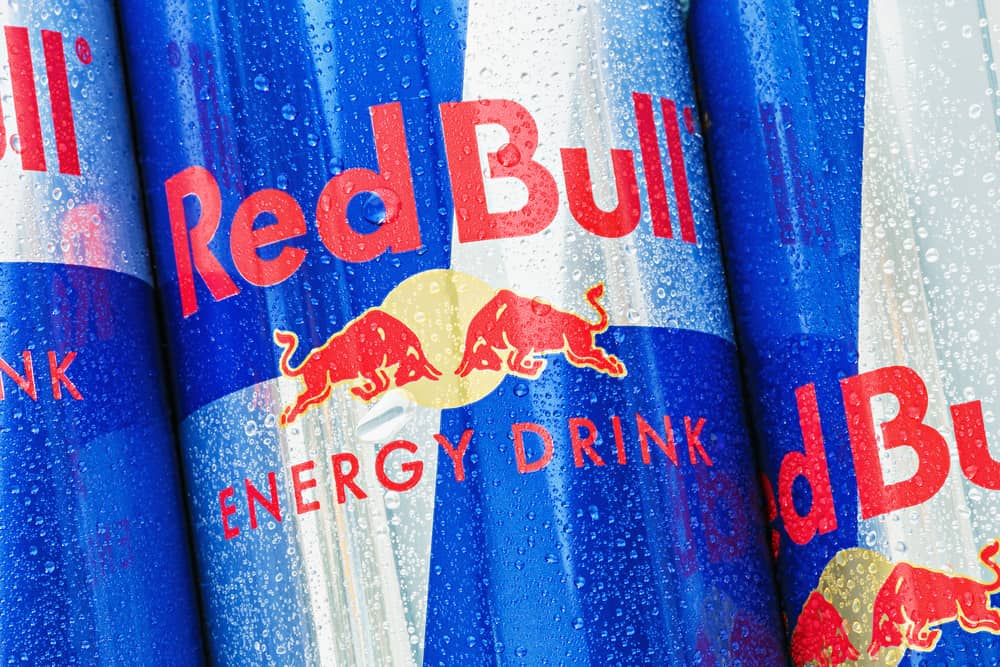If you are new to a plant-based life, you may be wondering if you have to give up your favorite energy drinks. This is why many want to know if Red Bull is vegan? The answer is that their ingredients are plant-based, but it doesn’t tell the whole story.
We’re going to take a closer look, and see why PETA is not so complimentary about them.
Is The Red Bull Company Vegan
As a company, their ethics are questionable which is why many vegans will avoid Red Bull products. The company themselves do boast that their drinks are all gluten-free and vegan. However, their definition is very different from that of PETA who had the following to say about Red Bull:
Although it’s a vegan product, the Red Bull GmbH company continues to support tests on animals, which are unnecessary, cruel, and not required by law.
Having said that, because Red Bull has come under pressure, we can keep our fingers crossed for some sort of positive response in the future.
Ingredients
Although there are various flavors, we are going to take a look at the original recipe. The ingredients read as follows:
Water, Sucrose, Glucose, Acidifier Sodium Citrates, Carbon Dioxide, Taurine (0.4%), Glucuronolactone (0.24%), Caffeine (0.03%), Inositol, Vitamins (niacin, Pantothenic Acid, B6, B12), Flavourings, And Colours (caramel, Riboflavin).
There is nothing too untoward about the ingredients list, but the questionable ethics are what make many vegans avoid this company.
Artificial Colors
Yes, it does. Some of their flavors include artificial colors, and this is a questionable ingredient for any vegan.
The likes of Red 40, which is made from petroleum byproducts, are not derived from animals, but it is tested on animals.
One of the most common ingredients in confectionery and beverages in the US, it is routinely tested on cows and rodents. Many rats are then euthanized after digesting large quantities of Red 40 so studies can be conducted on their organs.
Not all vegans avoid these ingredients, but many who don’t even consider themselves to be strict vegans will choose a cruelty-free diet where possible.
Then, there are the health concerns which include hyperactivity in children, although Red Bull is not suitable for the young anyway.
Taurine
Perhaps the name is derived from the fact that Taurine used to be produced from Bull’s semen. Nowadays, it is made synthetically and is usually vegan.
It is linked to enhancing athletic performance and therefore can be found in several sports drinks, as well as energy drinks.
Sugar
Anyone new to the vegan life will likely be unaware that a lot of sugar may not be considered vegan. This is because it could be processed with bone char.
Many companies in the US import the charred bones of cattle and pigs to use it as a bleach to make their sugar a more desirable white. For many vegans, this is a deal-breaker.
There is no trace of bone char once the process has finished but the issue is that it can be difficult to see who uses it and who does not. Most brands do not reveal this information and when asked, many of them will say they have multiple suppliers so it is hard to tell if bone char is used.
There are sugar-free versions of Red Bull should this be something you are concerned about.
How Much Sugar Does Red Bull Have?
A can of Red Bull contains 27g of sugar. This seems high by anyone’s standards which is why the Sugar-Free version is popular.
This is a large portion of your recommended daily intake so the safest approach would be to limit yourself to one can a day.
Anyone sensitive to caffeine should also avoid their products as they contain 80mcg per 8.4fl. oz can.
Vegan Alternatives
Because of their reputation for testing on animals, many vegans will avoid Red Bull.
To make sure you don’t have to miss out on an energy-boosting drink, we have found the following vegan alternatives:
ASPIRE Raspberry Açai Energy Drink
Natural caffeine and ingredients to please a plant-based diet, this is a good alternative to Red Bull for that energy lift.
The ingredients are as follows:
Vitamin C, Vitamin B6, Vitamin B12, Biotin, Calcium D Pantothenate (B5), Niacin (B3), Green Tea, Guarana Seed Extract, L-carnitine, Ginger Root, Natural Flavor, Taurine, Natural Caffeine, Sucralose, Carbonated Water, Citric Acid, Fruit and Vegetable Juice for Color, Sodium Citrate, Choline Bitartrate, Malic Acid, Calcium Lactate.
Ethans Organic Energy Drink – Blueberry
Made of only organic ingredients, it manages to boost energy without using a load of caffeine.
The ingredients in this flavor read as follows:
Organic guayusa extract, organic cordyceps mushroom extract, organic lion’s mane mushroom extract, organic pomegranate juice, organic blueberry juice, water, organic xylitol, organic lemon juice, organic stevia.
Buffalo Energy Drink
Using Swiss energy, this caffeine, and taurine-free drink claim to be vegan. The E150c color is made by melting sugar so it is also vegan.
This product is made up of the following ingredients:
water, sugar, carbon dioxide, acid: citric acid; acidity regulator: sodium citrates; flavoring, guaranà extract, caffeine (0,032%), color: E150c.
Final Word
Whilst it might claim to be the original energy drink on the market, it appears that Red Bull still uses a lot of old methods that are not acceptable to a vegan.
Thankfully, there are plenty of alternatives for giving yourself a pick-me-up throughout the day.



